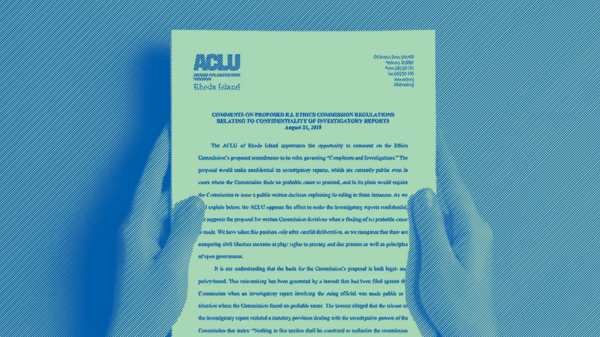The ACLU of Rhode Island has called on the Narragansett Town Council to table a proposed discussion of an ordinance tonight that would bar members of the public from making "personal" or "slanderous" remarks, or becoming "boisterous," during the public comment portion of Council meetings.
In a letter sent to the Town Council, ACLU of Rhode Island executive director Steven Brown said that "the consideration of such a proposal . . . sends the wrong message, and can only have a chilling effect on Narragansett residents and their willingness to speak their minds at the open forum sessions of Council meetings."
The ACLU letter acknowledged the Council's right to ban disruptive behavior, but in critiquing the proposal, asked:
"[W]hen does a pointed criticism of a Council member for their stand on an issue become 'personal'? Would a member of the public’s praise of a police officer for her off-duty organizing of a community event be considered out of bounds as a 'personal remark'? In light of the extremely heavy legal burden that public officials bear in pursuing suits for defamation, how often will sharp or rhetorical disapproval of a Council member inappropriately be deemed 'slanderous'? When will impassioned comments of a speaker – whether out of enthusiasm or anger – become improperly 'boisterous' and subject him or her to removal from the meeting? As these scenarios suggest, the recommended proposal would give the Town Council President virtually unbridled power to cut off speakers and control the content of what is supposed to be an open forum for public comment.
"In one of its most seminal free speech rulings, the U.S. Supreme Court noted this country’s 'profound national commitment to the principle that debate on public issues should be uninhibited, robust, and wide-open, and that it may well include vehement, caustic, and sometimes unpleasantly sharp attacks on government and public officials.' But, as the Court emphasized, 'it is a prized American privilege to speak one’s mind, although not always with perfect good taste, on all public institutions, and this opportunity is to be afforded for vigorous advocacy no less than abstract discussion.'"
The idea for the ordinance apparently came from a similar ordinance adopted by the Exeter Town Council a few months ago. But the ACLU letter said that "other municipalities should not follow that Town's questionable lead," and urged the Town Council to table the agenda item asking the Town Solicitor to draft a similar ordinance.

